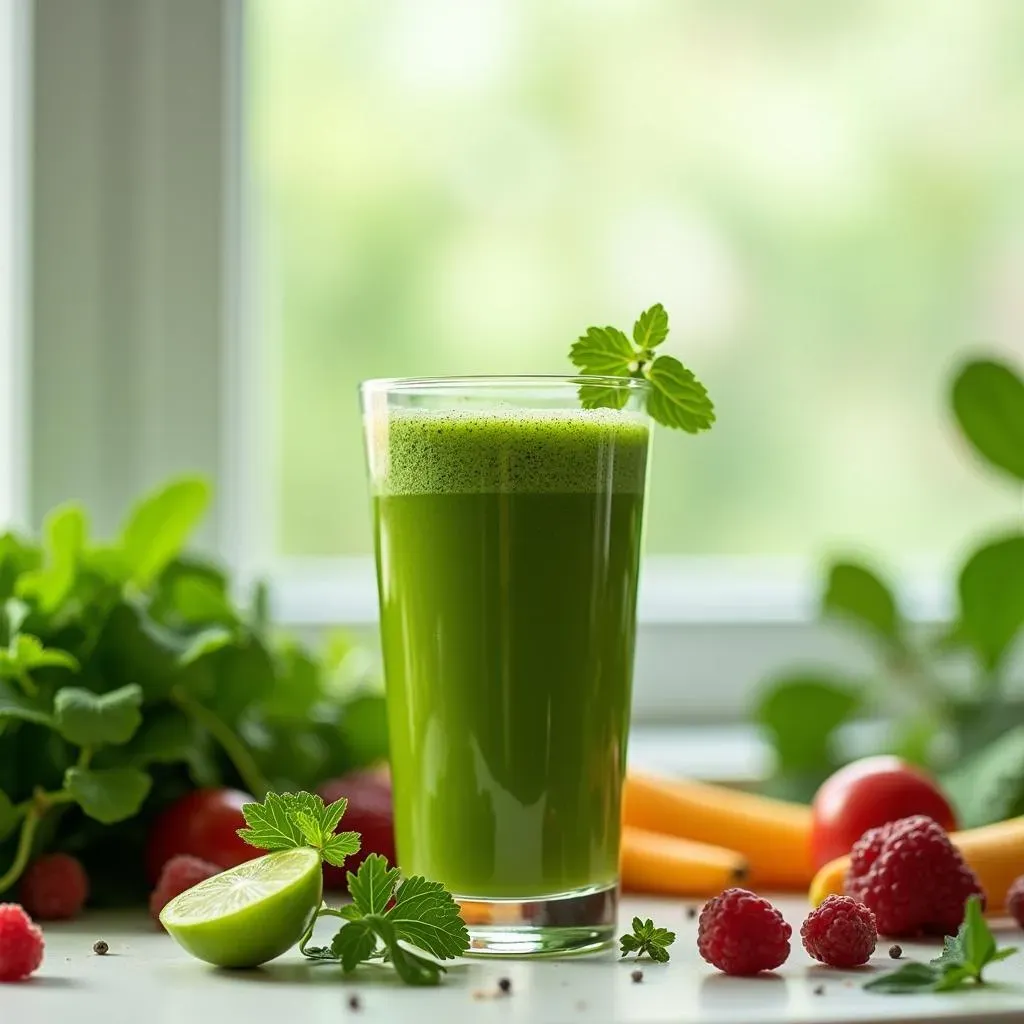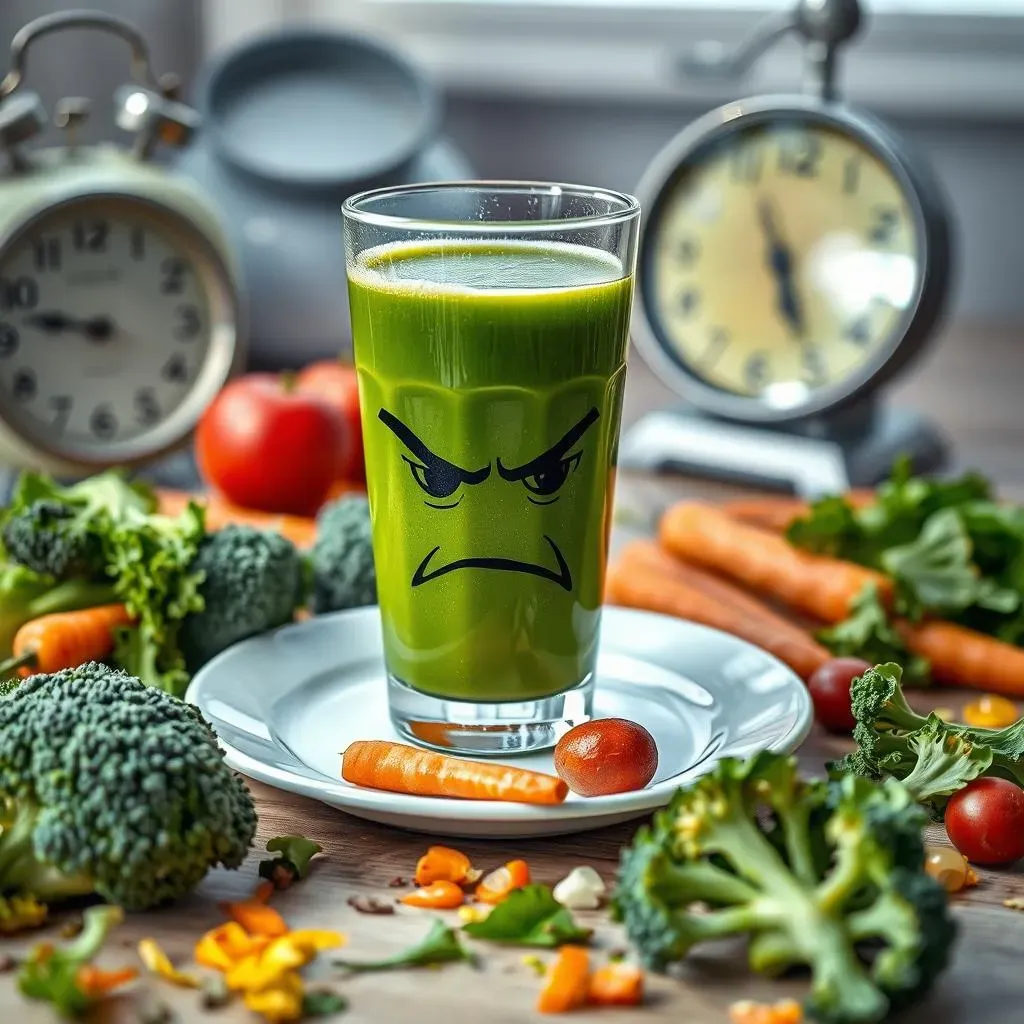Table of Contents
Thinking about jumping on the green juice bandwagon for a detox? You're not alone. Everywhere you look, people are blending up leafy greens, claiming amazing "green juice detox results." But before you empty your fridge into a blender, let's get real. This isn't about blindly following trends. It's about understanding what green juice can actually do for your body. We'll explore the potential upsides, like a vitamin boost and maybe a bit of a digestive reset. But we're also going to tackle the not-so-glamorous side, including the risks of too much of a good thing. Think kidney issues and blood sugar spikes. This article isn't about telling you to drink green juice or avoid it. It's about giving you the facts so you can make smart choices. We'll break down the real story behind "green juice detox results," helping you navigate this trendy topic with your eyes wide open. Get ready to separate the hype from the health.
The Good: Potential Benefits of Green Juice

The Good: Potential Benefits of Green Juice
Nutrient Powerhouse
so let's talk about the good stuff first. When you cram a bunch of leafy greens and veggies into a juice, you're basically creating a nutrient bomb. We're talking vitamins, minerals, and antioxidants galore. Think of it like a superhero smoothie, but without the cape – and a lot less sugar than most smoothies. You're getting a concentrated dose of all those things your body needs to function properly, which is pretty cool.
I'm not saying it's a magic potion, but it's a pretty efficient way to get a lot of good stuff quickly. I know, I know, eating your veggies is ideal, but sometimes life happens and a quick juice is a good backup. Plus, it can be a fun way to sneak in some greens you might not normally eat. I used to hate kale until I started juicing it with apple and ginger. Now, I almost crave it!
Hydration and Digestion
Beyond the vitamins and minerals, green juice can be a great way to stay hydrated. Since it's mostly water, it can help you reach your daily fluid goals. And let's be real, sometimes plain water is just boring. A little bit of cucumber or celery juice makes it way more interesting, trust me. Plus, some people find that it can help with digestion. It's like giving your gut a little rest while still providing it with some good stuff.
I remember when I first started juicing, I felt like my digestion was smoother, like my body was saying, "Thanks for the easy-to-process nutrients!" It wasn't a dramatic change, but a subtle feeling of lightness, which I'll take any day. It is not all sunshine and roses though, there are some things we have to watch out for, but we will get to that later!
Benefit | Why it's good |
|---|---|
Nutrient Boost | Packed with vitamins, minerals, and antioxidants |
Hydration | High water content helps you stay hydrated |
Digestion | Can be easier to digest than whole veggies |
The NotSoGood: Downsides and Risks of Green Juice Detox

The NotSoGood: Downsides and Risks of Green Juice Detox
Fiber Fiasco
Alright, so we’ve talked about the superhero side of green juice. Now, let's get into the stuff they don't always put on the label. First up: fiber. Or rather, the lack of it. When you juice fruits and veggies, you're basically throwing away the fiber, which is a huge mistake. Fiber is like the cleaning crew for your digestive system. It helps keep things moving, regulates blood sugar, and makes you feel full. Without it, you're missing out on a major part of what makes whole fruits and veggies so good for you. It's like going to a concert and only hearing the bass drum – you're getting some of the experience, but you're missing the melody.
I learned this the hard way. I was so focused on the "detox" part that I didn't think about what I was losing. I felt hungry all the time, and honestly, kind of sluggish. It turns out, my body was missing the fiber it needed to function properly. It's a crucial part of a healthy diet, and you simply cannot get the same benefits from juice that you get from whole food. Remember this: your body is smarter than a blender.
Sugar Rush and Kidney Concerns
Another thing to watch out for is the sugar content, especially if you're adding a lot of fruit to make your juice taste better. I mean, I get it, straight kale juice is not everyone's cup of tea. But all that added fruit can cause your blood sugar to spike and then crash, leaving you feeling worse than before. Plus, some leafy greens are high in oxalates, which, in large amounts, can cause kidney problems. It's not a common problem, but it's something to be aware of, especially if you're going overboard with the green juice. It’s like thinking you are helping your body but accidentally adding a hidden sugar bomb that your body is not happy about.
I know someone who went on a crazy juice cleanse and ended up feeling awful. They were all jittery and then exhausted, and they had a weird ache in their lower back. Turns out, they were overloading their system with sugar and oxalates. It was a good reminder that even healthy things, when taken to the extreme, can have negative effects. Moderation, my friends, is key. It's about finding a balance that works for your body, not just following the latest health trends.
Downside | Why it's a problem |
|---|---|
Lack of Fiber | Miss out on digestive benefits and blood sugar regulation |
Sugar Spikes | Too much fruit can lead to blood sugar crashes |
Kidney Issues | High oxalate levels can cause problems for some people |
Finding Balance: Making Green Juice Work for You

Finding Balance: Making Green Juice Work for You
The "Everything in Moderation" Approach
so now that we’ve covered the good and the not-so-good, let's talk about how to make green juice work for you. The key here is not to go overboard. I know it's tempting to go all-in on a juice cleanse, but trust me, that's not the way to go. Think of green juice as a supplement to your diet, not a replacement for actual food. It's about finding that sweet spot where you're getting the benefits without the downsides. It’s like seasoning a dish – a little bit enhances the flavor, too much ruins it. So, instead of chugging gallons of green juice, try having a small glass a few times a week.
I started by adding a small green juice to my breakfast routine, but I made sure that I still had a full and balanced meal. It’s like adding an extra layer of nutrients without sacrificing what your body really needs. I also found that it is better to make your own juice, that way you can control the ingredients. Store-bought juices are often loaded with extra sugar, so you don't really know what you’re getting.
Smart Ingredient Choices
When you're making your green juice, be smart about what you're putting in it. Focus more on veggies than fruit. Leafy greens like spinach, kale, and collard greens are great bases. Cucumber, celery, and ginger are also excellent additions. If you're adding fruit, stick to low-sugar options like berries or a small slice of apple. I also like to add a bit of lemon or lime for a little zing. And, for the love of all things healthy, do not add any extra sugar. It's like adding salt to something that is already salty, just do not do it. The goal is to make a drink that is nutrient-dense and low in sugar.
One of my favorite recipes is a mix of spinach, cucumber, celery, ginger, and a squeeze of lemon. It's refreshing and not too sweet. I’ve also experimented with adding herbs like parsley or cilantro, which can add a nice flavor boost. The key is to find a combination that you actually enjoy, so it doesn't feel like a chore. You can also use what you have in your fridge, I feel like you can create some unique combinations.
Tips for Balanced Green Juice | Why it's important |
|---|---|
Moderate Consumption | Avoid overdoing it; treat it as a supplement |
Veggie-Heavy | Focus on leafy greens and low-sugar veggies |
Low-Sugar Fruits | Limit high-sugar fruits; opt for berries or a small apple |
No Added Sugar | Skip the extra sugar to avoid blood sugar spikes |
Listen to Your Body
The most important thing when it comes to green juice, or anything health-related, is to listen to your body. If you're feeling great and energized, that's a good sign. But if you're experiencing bloating, digestive issues, or energy crashes, it's time to reevaluate. Maybe you need to cut back on the juice, or maybe you need to adjust your recipe. It's all about finding what works best for you, and not just following what everyone else is doing. I think that is a good rule for all things in life.
I’ve had days where I felt amazing after a green juice, and other days where it just didn’t sit right. I've learned that my body responds differently depending on what else I've eaten that day and how active I've been. Pay attention to those signals, and don’t be afraid to tweak things until you find that perfect balance. Remember, your body is your best guide, not some random health article on the internet. I am just giving you information, so do not take everything that I say as the ultimate truth.
The Final Sip: Making Informed Choices About Green Juice
So, what’s the bottom line on green juice detox results? It’s not a magic potion, and it’s definitely not a substitute for a balanced diet. While a daily green juice might give you a nutrient boost, loading up on it for a "detox" can actually cause more harm than good. Remember, whole fruits and veggies are still the champions of nutrition; they give you fiber, which is missing in juice. A little green juice can be a nice addition to your routine, but moderation is key. Read labels, watch out for added sugars, and listen to your body. The real path to wellness is about making informed choices, not falling for fleeting trends. So, sip wisely, and remember that the best "detox" is a lifestyle filled with balance and real, whole foods.